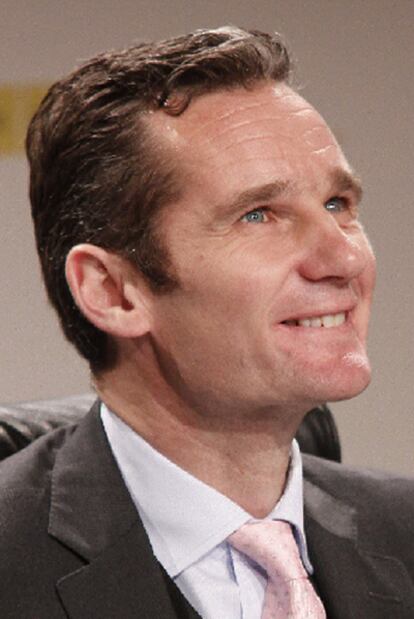New revelations in Urdangarin case reveal scale of wrongdoing
King's son-in-law thought to have sent funds to opaque London firm
New revelations about the business activities of Iñaki Urdangarin, King Juan Carlos' son-in-law, show that the scope of the alleged wrongdoing is even greater than originally thought.
Besides making profits of up to 170 percent over the real costs of the events his Nóos Institute - supposedly a non-profit group - organized for the Balearic and Valencian governments between 2004 and 2006, Urdangarin and his associate Diego Torres also diverted 500,000 euros to an opaque London-based firm that they had previously acquired through a foundation.
Over seven years, Nóos and its affiliates made nine million euros from private firms, and another seven million from regional governments, for services that authorities believe were non-existent or grossly overcharged. Later, that money was channeled to companies controlled by Urdangarin and Torres, who is already facing charges of misappropriation of public funds.
The growing case against Urdangarin is an offshoot of a wider corruption case known as Palma Arena, for which the then-regional premier, Jaume Matas of the Popular Party, is awaiting trial.
The story is all the more remarkable because it is the first time that a member of the Spanish royal family has been involved in such a public scandal. The family of Juan Carlos I has always been largely left alone by the Spanish press, partly in recognition of his role in defending democracy during the failed coup of 23 February, 1981.
But in a context of economic crisis and growing social unrest, it seems that even the royals are not safe from scrutiny.
In an early attempt at damage control, the royal family had a special envoy investigate Urdangarin's business dealings in 2006, and ultimately recommend that he leave the country for a while. That was the real reason for the sudden move of Urdangarin, his wife the Infanta Cristina and their four children to Washington, where the former handball Olympic champion was given a post at Telefónica International. But in the end, attorneys investigating the Palma Arena case noticed the suspect public contracts and launched an investigation that will certainly end with Urdangarin's arraignment, sources said.
Urdangarin, once viewed as the ideal husband for a princess - his father was a banker, his mother an aristocrat, and he himself a successful sportsman - has suddenly become a pariah. It is a hard fall for a man who retired from competition at the age of 32, still at the top of his game. But Urdangarin, who always had an eye for business, got a master's degree from Madrid's prestigious business school Esade, where he took a course with an instructor named Diego Torres, who would eventually become his partner.
Together, they created a non-profit called Nóos Institute for Strategic Studies in Sponsorship and Patronage, a "think-tank" that embarked on a mission to find regular sponsors for its sports, tourism and health events in the private and public sectors. At one of these sessions, they recommended that companies pay them an annual fee of 25,000 euros for the privilege of "ownership" of one of the "values" that Nóos disseminated, and for company training.

Tu suscripción se está usando en otro dispositivo
¿Quieres añadir otro usuario a tu suscripción?
Si continúas leyendo en este dispositivo, no se podrá leer en el otro.
FlechaTu suscripción se está usando en otro dispositivo y solo puedes acceder a EL PAÍS desde un dispositivo a la vez.
Si quieres compartir tu cuenta, cambia tu suscripción a la modalidad Premium, así podrás añadir otro usuario. Cada uno accederá con su propia cuenta de email, lo que os permitirá personalizar vuestra experiencia en EL PAÍS.
¿Tienes una suscripción de empresa? Accede aquí para contratar más cuentas.
En el caso de no saber quién está usando tu cuenta, te recomendamos cambiar tu contraseña aquí.
Si decides continuar compartiendo tu cuenta, este mensaje se mostrará en tu dispositivo y en el de la otra persona que está usando tu cuenta de forma indefinida, afectando a tu experiencia de lectura. Puedes consultar aquí los términos y condiciones de la suscripción digital.








































